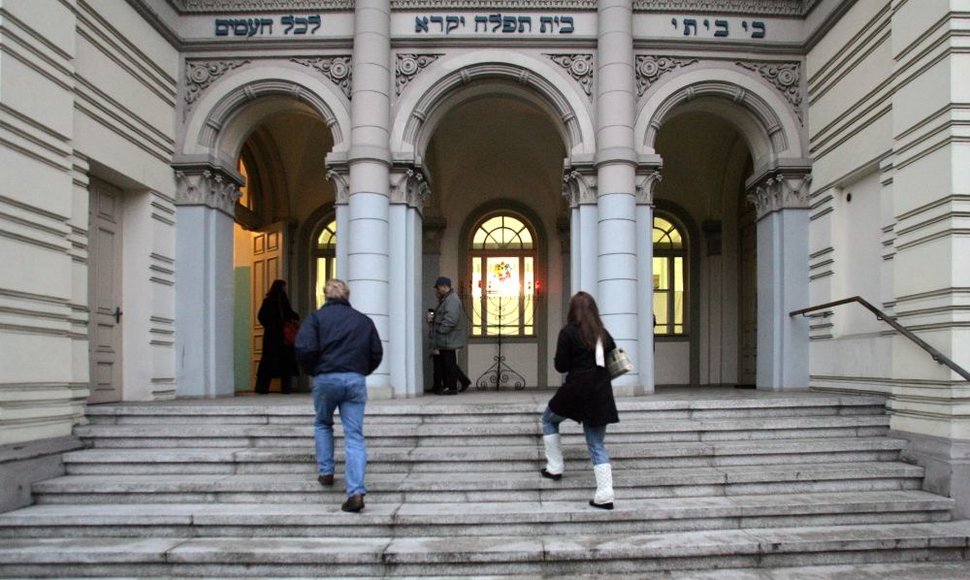15min has talked to people who follow closely the Jewish restitution issue and their judgements are rather mixed. Some say that most countries have paid out compensations to Jews long ago, while others maintain that Lithuania is showing off by offering the highest percentage of compensation in Europe. Which one is the right way to look at it – neither Jewish organizations nor state institutions were able to say conclusively.
“I think this solution might set a certain example to other countries with historical conscience issues,” said Prime Minister's Chancellor Deividas Matulionis, after the Government appointed a Jewish foundation to manage the compensation money. The promised 128 million litas (37 million euros) should reach the fund in the course of one decade. This year, 3 million litas should be transferred to the fund's accounts, to be distributed among Lithuanian Jews who lived here during World War Two.
First or last?
Faina Kukliansky, deputy chair of the Lithuanian Jewish community, tells 15min that most states have already made decisions on compensating Jews for expropriated property.
“This question has been settled almost everywhere in Western and Eastern Europe. Lithuania was one of the last to do so – Latvia is another country that hasn't settled it,” she stresses.
Vilius Kavaliauskas, who served as advisor on property restitution to Lithuania's Jewish religious communities under social democratic prime ministers from 2002 to 2008, begs to differ. According to him, it is Austria and the Czech Republic that have advanced furthest in these matters, while other countries are stuck at different points in the process.
“In the Czech Republic, the restitution was carried out in stages, real estate was returned first, synagogues and cemeteries. This, though, caused some headache to Jewish organizations that now have to take care of keeping up the cemeteries,” Kavaliauskas says.
He adds that in many other countries, debates on compensating for expropriated Jewish property have not been concluded yet. “We are running ahead of the train,” according to him.
Austria unwilling to pay
The World Jewish Restitution Organization (WJRO), that holds talks with governments over compensations, lists in its website sums that some states have agreed upon with Jewish organizations.
For instance, in 2001, the above-mentioned Czech Republic founded a relief fund for Holocaust victims. The Czech government has transferred 10 million US dollars to it. Two thirds of the sum is intended for social servicing of Holocaust survivors and maintenance of Jewish communal property. By the set deadline, the federation of Czech Jewish communities presented a list of 202 objects to be returned; over the last 7 years, 100 were returned, excluding cemeteries. It has been noted that three objects of particular importance have not been transferred yet.
WJRO website does not provide any information on Austrian compensations, but according to data available to the Justice Ministry, Austria's negotiations with Jewish organizations started off with great difficulty – partly because the government maintained that the Austrian state was Nazism's first victim. However, in 1956, a special assistance fund was set up to distribute one-off allowances to people who were persecuted for their race, religion, nationality, or political convictions.
By 1976, the fund had amassed 115 million euros. Another fund has paid out 5 thousand euros to Nazi victims.
In 2001, Austria signed an agreement with Jewish organizations on returning property and social benefits for Jews residing abroad. According to the agreement, 480 million US dollars were to be put aside for the purpose, including 210 million in compensations for lost property.
Property restitution is being carried out in two ways – by returning surviving buildings or paying compensations. According to Kavaliauskas, Austrian compensation amounts to 12 percent of the property value. By the 2003 deadline, the Government had received 20 thousand applications for compensation.
Annual instalments
WJRO indicates that Hungary has already settled the question of Jewish communal property; however, there still remains a question of how to deal with property owned by private individuals. In 1997, Jewish communities agreed to receive annual payouts from the Government in exchange for waving their claims to real estate.
Before World War Two, the Hungarian Jewish community owned 1.2 thousand cemeteries and 2.6 thousand other objects. Jews reclaimed some of those buildings, another 152 objects were compensated for with a total sum of 75 million US dollars; the restitution of Jewish religious property was concluded by 2006.
Jewish organizations were outraged by Hungary's private property restitution laws, which stipulated that compensation for property was to be merely 5-10 percent of its market value and could not exceed 21 thousand US dollars. After the talks, a newly set up Public Jewish Heritage Support Fund was handed over 15 million US dollars, 7 buildings, and 10 pieces of art.
Following negotiations with WJRO, the Hungarian Government agreed to pay 21 million US dollars over 5 years, including for uninherited ancestral property. The organization indicates that 12.6 million US dollars were transferred to the fund in 2007.
8-billion-euro claim
According to the Justice Ministry's data, the Slovak Government has returned over 300 objects of property to Jewish communities. It was agreed in 2001 that the total value of Jewish property expropriated during the Holocaust was 185 million US dollars. So the Government entrusted a special fund with 10 percent of of the sum – about 18.5 million.
Those owners or their heirs who were ineligible to receive compensations – because they were not citizens of Slovakia – each received on average 16 thousand US dollars from the fund.
After this year, the remaining funds should be handed over to Slovakia's Jewish Organizations Union. There is one issue, though, that remains unsettled – the retribution of 400 thousand hectares of farmlands that the Jewish community wants returned.
In Romania, Jewish property was confiscated as early as 1941. In 1944, the communist regime revoked anti-Jewish laws, but between 1948 and 1989 the state carried out large-scale property nationalization. Romania could hardly return all the property expropriated between 1940 and 1989, since claims in Bucharest alone totals 8 billion euros.
Romanian Jewish organizations demand buildings that are currently owned by working companies. The Justice Ministry says that even though Romania works hard on improving existing laws and adopting new ones on national minorities' property restitution, part of the problem is the demand to provide very detailed documentation proving past ownership. According to data from 2009, out of 2 thousand applications submitted to the restitution institution, only 300 were accepted. Romania has satisfied only half of them.
Poles and Latvians resist
WJRO website is not kind to Poland. “Poland is the only major country in the former Soviet bloc that has taken no action to return private property confiscated by the Nazis or nationalized by the Communist regime,” it says. According to the organization, the country has considered a number of property restitution bills over the last few years, but none was passed.
In Poland, WJRO has filed 3.5 thousand claims (600 of them involve cemeteries), local Jewish communities – another 2 thousand. Their processing is hopelessly stuck. According to Kavaliauskas, Poland has yet to settle with Jewish communities on the amount of compensation for expropriated wealth. The Government has offered 15 percent of its current market value, while Jewish representatives ask for 20.
In 2003, Latvian Jewish communities demanded that the definition of expropriated communal property be expanded. At the same time, the Latvian government and the country's Jewish community made a deal on the return of 14 buildings and a compensation of 60 million US dollars. The parliament, however, rejected the bill and blocked any attempts to settle the issue.
WJRO says it has no reproaches to Estonia. Before the war, the country did not house much Jewish religious or communal property. Some of it has been returned and Estonia has essentially concluded property restitution.
Vilius Kavaliauskas, former Prime Minister's adviser, says:
 |
| Laikraščio „15min“ nuotr./Vilius Kavaliauskas |
“The way that Lithuania concluded negotiations with its Jewish community over compensation raises many questions for me. Where do these figures come from? No one has yet been able to provide an answer to this question. 128 million litas – it's a figure that seems to be taken off the cuff. When I was in office, it was agreed that Lithuania would offer a record-high compensation – 28 percent of current property value. However, back then that meant 50 million litas; how did it suddenly become 128 million? I think that the state acted beyond its means.
“The Jewish community representatives have unofficially agreed to a compensation of 60 million litas. I do not understand what has changed, I hear no acceptable explanation why the new government has inflated the compensation sum.”
Deividas Matulionis, Prime Minister's Chancellor, retorts:
 |
| Andriaus Ufarto/BFL nuotr./Deividas Matulionis |
“I can say that Mr Kavaliauskas is talking nonsense. Under the social democratic government, he himself was the one who drafted the bill that is now the basis for compensations for the Lithuanian Jewish community. The conservative government only finished the process. So his criticism sounds really odd, I am startled by such strange a position. No one has ever measured anything in actual sums – 60, 50, or 10 million. It is a gesture of political will.
“It has been calculated how much property should be returned to Jews. At first, we considered perhaps compensating it in full, but it turned out to be unbearable, so we settled for 30 percent. We should not look at it as if it were some percentage – but rather as a Law of Good Will. There are various percentages in different countries that chose different models.”













